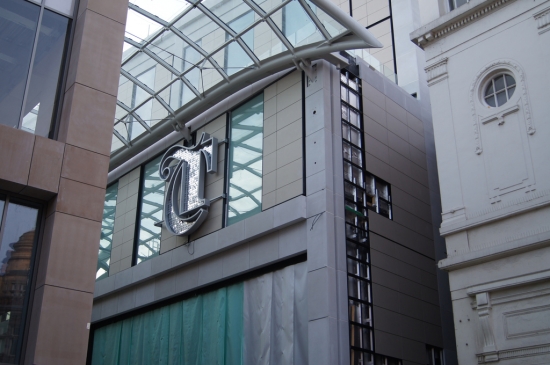With recommendations from the Portas Review coming into effect across the country, there are hopes that the UK’s ailing high streets will have a chance to fight back against the out of town shopping malls and internet retailers currently managing to poach consumers away.
Yet critics have claimed that local review boards have failed to spend their allocated budgets wisely – for example, several towns have spent money hiring actors dressed as children’s television characters rather than making cosmetic improvements to town centres – which has led to calls for new ideas in the battle to revitalise the high street.

Trinity Leeds
Some believe that Leeds may have hit upon the ideal solution to attract a new generation of shoppers back into Britain’s deserted towns. On the 21st of next month, a £350 million modern development known as Trinity Leeds will open its doors to consumers, making it the only major shopping centre development to be launched in the UK this year.
However, unlike in recent years, this complex will not sit on the border of Leeds – it will sit smack in the heart of the city centre.
The 1 million sq ft supermall, developed by Land Securities, has already managed to attract many big-name retailers including Primark, Marks & Spencer, Topshop and Next. In fact, the leases have already been agreed upon in 90 per cent of the complex by value, with less than 80 per cent remaining to be snapped up in terms of floor space.
This is certainly surprising given the fact that the terms “retail success” and “town centre” have rarely been seen together since the craze for out of town retail parks hit the UK. Furthermore, with the recent spate of high profile retail administrations being largely put down to a consumer migration online, many experts predicted that big names would be a little more cautious about investing in commercial property until consumer confidence rose again.
However, Land Securities overseer Andrew Dudley believes that Trinity Leeds is an attractive prospect for retailers as it is the next stage in retail evolution.
He says; “We have tried to take shopping forward in the UK.
“Experience is everything – you really need to excite people about coming into towns and cities.”
From a technological perspective, it does seem that the project planners have managed to admirably merge the physical shopping experience with all the perks of an online marketplace.
Screens have been erected throughout the complex – some will be interactive and encourage shoppers to play online games, while others will show local news bulletins and possibly in future show live music events from nearby venues. Wi-fi will be accessible both in stores and in social areas, while entertainment options including a cinema will be available to break up a day of shopping.
Yet many will argue that some benefits of online shopping cannot possibly be matched by the physical experience. Not having to carry around heavy bags all day, for example, is a definite bonus of the internet.
However, Trinity Leeds has even managed to combat this pet peeve. Its customer service centre will provide space for consumers to leave their bags while they pop to the cinema or for a bite to eat, and will even operate as a click and collect point for those who wish to order online and pick up in person.
But best of all, Trinity Leeds manages to blend into its surroundings. Entrances to the complex are gated rather than sealed so shoppers can dip in and out of the shopping centre and surrounding streets at will. This has allowed for a greater flexibility in retail space too – Marks and Spencer and Topshop have chosen to extend their existing stores into the project rather than taking entirely new leases, for example, so they have fronts both in Trinity Leeds and on the high street.
Marketing manager for Trinity Leeds, Paul Smith, has many plans for the future of the supermall and hopes that the leisure activities alongside the retail aspect will draw in the crowds.
He says; “Retail is not just about shopping. It’s about taking the best from online, the high street and events venues and bringing it into one place.”
Yet while Trinity Leeds does certainly seem like the biggest boost the high street has seen in years on paper, the reality may be quite different. There is a real worry that, by collecting so many well-known brands in close proximity, independent stores will struggle as consumers fail to venture out of the comfortable modern complex.
Furthermore, it is not likely to have much of an effect upon consumer confidence. Rather than encouraging consumers to spend more, it is highly likely that Trinity Leeds will simply encourage shoppers from surrounding towns such as Bradford and Doncaster to switch where they shop. This, in turn, could have a devastating effect upon these already struggling town centres.
Leeds Love Affair blogger Lola Wilson says; “I think the city is split over Trinity Leeds.
“It’s been very sympathetically designed but the concern is that it will drag brands out from the now-full shopping streets.
“Independents have done incredibly well during the downturn and that’s what gives Leeds its character – Trinity hasn’t really included independents and I’m not convinced it adds any personality to Leeds.”
Do you think supermalls in town centres will encourage consumers back to the high street or will they simply create crowds in one area and leave others abandoned? Is it more important for towns and cities to make a profit by building forward-thinking supermalls, or to preserve their spirits by assisting in the longevity of their independent retailers?